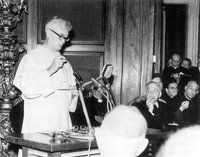Edward Schillebeeckx on the Eucharistic Presence

. . . The eucharist is the sacramental form of this event, Christ's giving of himself to the Father and to men. It takes the form of a commemorative meal in which the usual secular significance of the bread and wine is withdrawn and these become bearers of Christ's gift of himself-"Take and eat, this is my body." Christ's gift of himself, however, is not ultimately directed towards bread and wine, but towards the faithful. The real presence is intended for believers, but through the medium of and in this gift of bread and wine. In other words, the Lord who gives himself thus is sacramentally present. In this commemorative meal, bread and wine become the subject of a new establishment of meaning, not by men, but by the living Lord in the church, through which they become the sign of the real presence of Christ giving himself to us. This establishment of meaning by Christ is accomplished in the church and thus presupposes the real presence of the Lord in the church, in the assembled community of believers and in the one who officiates in the eucharist."


1 Comments:
Jesus' words at the passover meal after breaking bread: "Take and eat, this is my body," were taken literally by the early church fathers. This belief became embedded in church doctrine, still to this day. Its purpose is to maintain the bond of 'togetherness' for Christian believers. In reality it is symbolic of being invited to a meal prepared by Jesus. The real purpose of the words: "Take and eat, this is my body" uttered by Jesus at the Last Supper, is to uplift the dignity of the persecuted, the downtrodden and the outcasts of society.
Post a Comment
<< Home